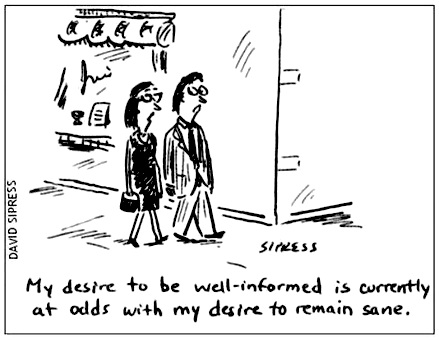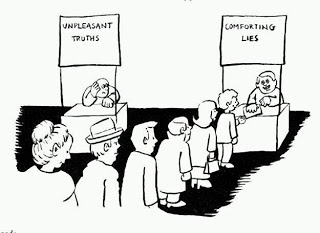Cognitive Dissonance Defined
“Cognitive dissonance is an uncomfortable feeling caused by holding two contradictory ideas simultaneously. The “ideas” or “cognitions” in question may include attitudes and beliefs, the awareness of one’s behaviour, and facts. The theory of cognitive dissonance proposes that people have a motivational drive to reduce dissonance by changing their attitudes, beliefs, and behaviours, or by justifying or rationalising their attitudes, beliefs, and behaviours.”
Confused
Two Beliefs in Conflict
B. Everywhere I look around me, everyone was going on about their business as if there was nothing wrong and everything is smelling like roses. Even the global recession was said to be over which so many pundits spruiked. I didn’t believe for a second and history shows that I was correct in this belief.
Since then, a lot of time has passed, so I don’t think this way much any more, well not as often as I did. I have come to realise that cognitive dissonance is the first stage of awareness about an issue, and although it is very confusing for a while, you suddenly realise that these massive issues are not all full of doom and gloom, but are filled with hope and opportunity.
Acceptance
Thinking of the worst case scenario only paralyses people (and yourself) with fear, and you fail to act. By describing a message of hope and a better life without loss of lifestyle, it is an easier way to engage others and keep them interested in the simple changes you have made yourself. It took me a while to figure this out, but hey, I have always been one to learn from my mistakes (eventually).
Influencing Others
I have found that when I talk about my lifestyle at work in a positive way, I get far more interest than if I had started telling people about the big issues that face us.
Actions Help, and Seek Like Minds
So, take hope if you are feeling cognitive dissonance right now, because it will pass as you learn more. I suggest that you don’t ignore it, but act upon it.

Have you ever had environmental cognitive dissonance, and how did you react to the opposing thoughts or ideas? I would love to hear your experiences via a comment.



Hi Gavin and family,
This post was excellent! This is the issue that I am dealing with right now with my family. I have three adult children, and two of them are carring on as if there are no issues and it scares me. The other one is full into solar power, biking everywhere and learning to forage and grow for himself. Perhaps I need to take your advise and come at this from a different angle. They obviously think mum has gone off her rocker 🙂
Thanks again, Gav, for your words of wisdom!
Barb
Here in the US, there is no better example of cognitive dissonance than the ongoing bread-and-circuses spectacle of the US Presidential “race”. Neither candidate or party has uttered a syllable in this campaign that suggests they have any concern over the real issues that confront us. It’s all just the usual partisan rhetoric, making promises to the voters that they can’t keep because they are so beholden to the special interests that are pouring billions into this campaign.
What frightens me is that so many are still believing, fervently, that one party or the other will be our salvation. I had to laugh when one candidate claimed that he’ll make all of North America energy independent by 2020. (Not just the US, mind you. All of North America. Has he discussed this with the Canadians?) Another guy promised that if he was nominated (he wasn’t) and elected he’d lower the price of gas to $1.50/gallon. It’s all buffoonery, smoke and mirrors, a con game.
And the band played on…right?
I’m not sure if this is an example of CD or something else, but I occasionally get this really weird disconnect when someone asks me something like “why would you bother trying knit socks when you can just buy them?”, or “I would rather just buy my chicken from the supermarket so someone else has to kill and butcher them”. These comments are so far removed from my current way of thinking and doing that they often leave me speechless, I can’t even begin to explain these concepts to someone who is questioning the underlying ideals of self-sufficiency!
Cognitive dissonance prevailed the whole time I was an omnivore. It took reading Peter Singer’s “Animal Liberation” to realise that I was wrong. I realised this when I tried and tried to fight back at Singer’s arguments, but couldn’t on rational terms. What was I to do – continue to consume animal products and contribute to the suffering of billions of animals, and dismiss Singer’s points? Or do something positive about it? I went vegetarian immediately and vegan not long after.
As an activist I come up against cognitive dissonance-backed objections every day. I don’t think anybody will disagree that treating animals badly is wrong, and to a lesser extent, that using animals to satisfy our arbitrary ends is wrong. But it’s difficult getting people to take the argument seriously and do something about it.
People, such as Gavin, have made great changes to his consumption habits. This includes food. This has been rationalised on environmental grounds. However, it seems that tastebuds always get in the way. Why is it that tastebuds are considered some sort of appreciate moral determinant anyway?
Appropriate **